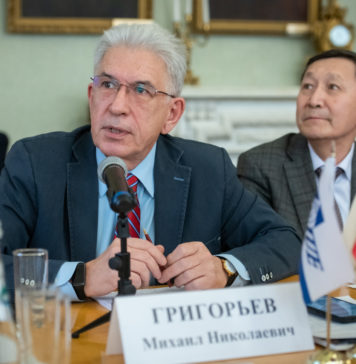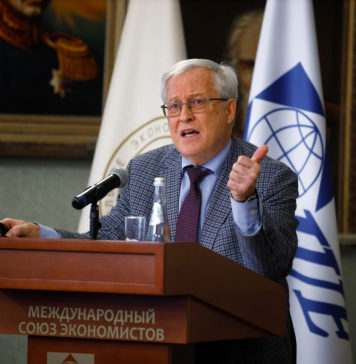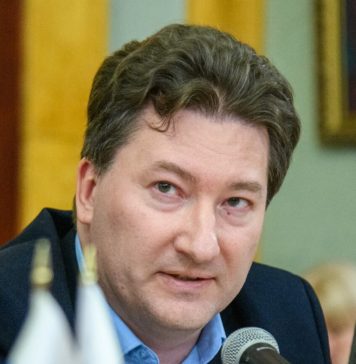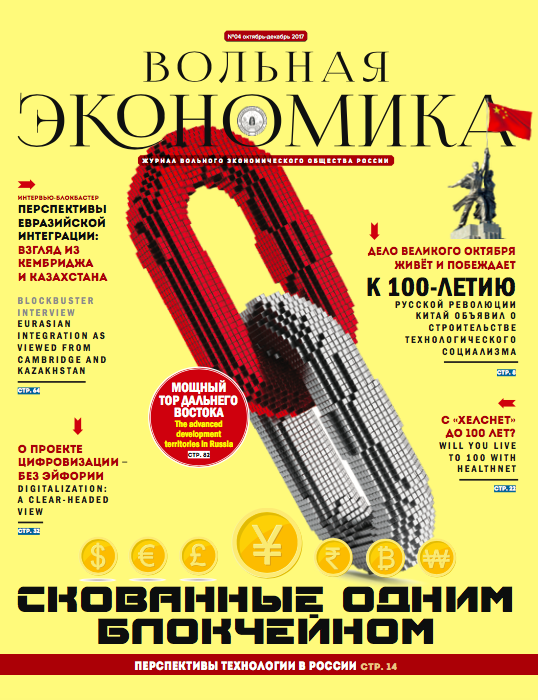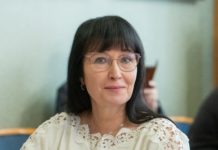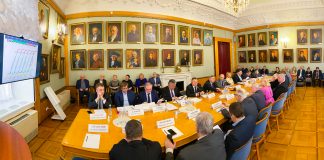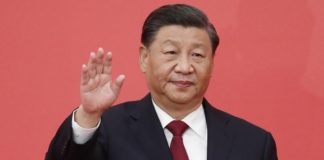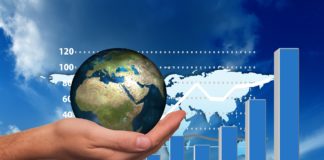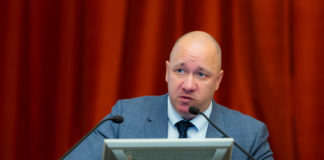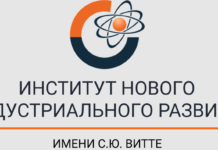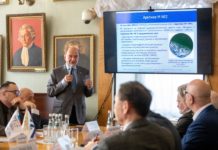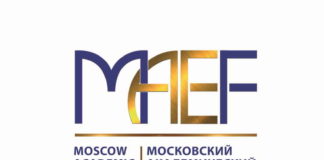Interview with the RAS expert, President of the Free Economic Society of Russia, Director of the S.Yu. Witte Institute of New Industrial Development Sergey Dmitrievich Bodrunov
What will the world economy be like after the coronavirus pandemic: what major economic and business changes are coming? Is it appropriate to compare the current situation with the Spanish flu and the First World War? How did coronavirus reveal contradictions in the modern economy? And why is Russia’s reaction to the crisis more painful than the world’s? These and other questions are answered by Sergei Dmitrievich Bodrunov, Doctor of Economics, Professor, Expert of the Russian Academy of Sciences, President of the Free Economic Society of Russia, Director of the S.Yu. Witte Institute of New Industrial Development.
— During the MAEF online session, you said that long before the pandemic the modern market model had been showing signs of exhaustion and was in need of deep transformation. Please explain your point of view.
— The economic model that exists today in the world is based on free market economy, private property and profit as the main result of business activity. It means that it is not focused on satisfying people’s needs, their real needs, but rather on making profits – by any means and at any cost. Including through the satisfaction of people’s needs, but only partially. Hence the foisting of so-called simulative, fake needs, which are often easier and more effective to satisfy in terms of capital. Capital is being poured into such areas, while investment in the real production sector is declining. Thus, an increasingly significant portion of the product of economic activity, which requires real resources, is becoming simulative. This model has been increasingly losing the ability to cope not only with the cyclical nature of economic development, but also with the whole range of fundamental and deeply inherent contradictions. On the one hand, it is about maximizing profits. On the other hand, profits come from satisfying the needs of people. But at the same time, solving the problem of maximizing profits leads to the fact that the needs of people are satisfied to the extent that they can be satisfied with maximum possible profit. It means that social inequality and the stratification of society will only be growing in the future. The part of the population that is supposed to pay (i.e. the main stratum of the population) is constantly paying, but less and less. And the group that receives the financial product of the economic is activity consolidating their incomes and is becoming more closed and elitist. Today we can observe this process quite clearly.
In general, a situation like this has always been observed since the establishment of the current economic model. But at certain stages, the problem was more or less mitigated due to scientific and technological progress, which at times shifted the economic component towards better satisfaction of people’s real needs. And so, at the times of transition to a new technological mode, it was possible to mitigate those contradictions. However, the current transitional stage to a new, sixth technological mode is fundamentally different from the previous ones and is characterized by the fact that the current state of scientific and technological progress, given the specifics of its technologies, prevents this problem from being solved within the framework of such a model. It would seem that the achievements of modern scientific and technical progress are already such that they, to a certain degree, make it more or less possible to feed, clothe and keep people warm and to create acceptable living conditions everywhere in the world. But the reality is different. On the contrary, global capital uses scientific and technological progress, which advances “with acceleration”, in the framework of such a model as an instrument (a very expensive one and inaccessible to the majority!) serving its essential goals. In practice, for better siphoning off money from the real sector to financial and intermediary markets and the like. And for impoverishing the population segments that do not have wide access to capital and resources. For the stratification of society. For the impoverishment of ever greater population strata. The model that is functioning today, results not in mitigation, but in exacerbation of the main contradictions and leads into a dead end. The poor are getting poorer, and the rich are getting richer. Sooner or later, it will end either in a social explosion or in the exhaustion of the model itself. That is the situation, therefore, the current model needs to be transformed, which would change the attitude and fundamental approaches to meeting the needs of people.
The latest crises which have been constantly intensifying are different from the crises that occurred in the initial stages of the development of capitalism. They are not overproduction crises; they are based on a different problem.
— Is it true that coronavirus triggered and showed more clearly the contradictions of modern economy? And why?
— The modern economy is not just global and exhausted; it is also very interdependent. It is an important feature of the modern economic model. And the pandemic just exposed this high degree of interdependency. If an important link is missing from the development, production or logistics chain, then a problem will arise and spread across all technological and production areas. When such events as the pandemic occur, they may switch the development of the economic situation to the negative side.
— The global economy after the coronavirus pandemic: what is it like?
— Of course, changes are coming – not dramatic, but noticeable.
First of all, changes are expected in the application and development of new generation technologies. Humanity is always moving towards new knowledge to meet more new needs. And new knowledge, as a rule, turns into new technology if we mean real needs of people. New technologies, like sublimated knowledge, create a new idea of life, of the world. A new reality. In some cases, it happens more rapidly, dramatically, in others – less.
I am sure significant changes in the application and development of new generation technologies will occur in labor. Already, many companies are declaring that they will abolish office jobs. They will switch to remote work. Many positions will be reimagined in terms of production management.
Changes are expected in education. A few years ago, I was invited as a professor to one of our universities. I suggested, given my work schedule, to conduct part of the classes remotely. The administration didn’t allow me to do this. Today, no one will object. The pandemic taught everyone to accept distance learning. I think that remote technologies in education will advance rapidly.
The current situation in education can be compared with that during the times of Gutenberg, when printing was invented. There was also a big discussion back then: is it necessary to print books, or should the professor share his knowledge in person? As it turned out, knowledge can be shared remotely, through a book. Moreover, at any distance, both in space and in time. And this greatly accelerated the process of education and the process of accumulating knowledge. Today, online education is, to a certain extent, a new “typography”. And we will be observing even more accelerated implementation of remote technologies. In my opinion, this will lead to a surge in man’s knowledge of his environment and to an even greater revolutionization of scientific and technological progress.
In general, it is important to understand that knowledge is not only knowledge of the world, but, from the point of view of economics, it’s the main resource of society’s next development stage – I call it the new industrial society of the second generation. Today, in contrast to the previous stages when there were other main resources (e.g., energy), it is knowledge that has become the main economic resource. And therefore, the consumption and processing of knowledge must increase. Hence the development of appropriate technological tools.
Next is scientific knowledge. If we take, for example, contacts between scientists and conferences, where particular scientific models and theories are being discussed, we already conduct most of those interactions online.
Unmanned systems technologies, over-the-Internet control and robotics will feature in the production of real sector goods. Everything that was supposed to appear by 2030-2040 will make its appearance 5 or 7 years earlier.
And finally, changes are coming to the fields of culture, tourism, knowledge of the world, and to the household. For example, the Internet of things is developing very fast. Both in production and in everyday life, it will make a significant contribution to changing our worldview and life.
— Is it appropriate to compare the current situation with the times of the Spanish Flu and the First World War? Or is the current situation unique?
— There is a commonality between past and current events. Both crises are the consequences of a generally accepted and, in fact, continuing economic model of society. There are also some external common features. Coronavirus, as well as Spanish flu, caused a global pandemic. If compared with the First World War, the war contributed to the spread of the Spanish flu due to movements of human masses and the acceleration of the movement of goods. Naturally, all this contributed to the spread of the epidemic. At present, transport has been rapidly developing for many years. Every ten years, the amount of goods transported almost doubles, and movements of people have increased astronomically. In addition, the cause of the current crisis is also of an epidemiological nature. There is a kind of similarity between the current situation and the situation that existed a century ago. But the current pandemic is not as horrible as the Spanish flu; in those days people were dying in the millions, now there are significantly fewer victims. I won’t say if it is connected with the difference in the “maliciousness” of the viruses, but it’s certainly connected with the fact that the level of our knowledge, our understanding of the world and, accordingly, medicine and technology has changed.
As for Russia specifically, the difference between the current crisis and what was happening at the beginning of the 20th century is that it’s associated with a reduction in oil and gas prices – the main resource of Russia’s present-day economy. A war has broken out in the oil market, which gave it a heavy shock. So, one of the “fathers” of the current domestic crisis is the shock to the oil and energy markets. And, like in a “perfect storm”, it was augmented by a pandemic and a halt in economic activity. It’s what makes the current situation different from what happened a century ago.
Today, in addition, we observe that these two problems coincided with others that have already been in existence. In recent years, there has been a slowdown in the growth rate of the world economy; many problems of various nature have arisen, which stem from the economic model in which we currently exist. And it also affects our economy. Therefore, the current crisis is more serious than the one during the Spanish flu.
— Has the coronavirus epidemic affected the growth of the Russian economy more than the decline in oil prices?
— It seems it has. The Russian economy as a whole is in a rather difficult situation. For many years, for various reasons, the economy has been struggling, with a relatively insignificant growth over the last decade. There is a problem with demand — the main factor that affects the “resolution” of the crisis. The stagnation of the population’s income continued for many years, and as a result we lost 5-6 years in terms of income. Before the epidemic, household incomes increased by nearly 1% compared to the last year, and when compared with what they were five years earlier, they are 5.5-6% lower. Demand being as it is, the private investor cannot actively invest in economic entities, in the development of sectors that fill the market. On the other hand, if there was a need for development, there would be investments, even if the conditions were not very comfortable for the investor and the institutions were not particularly developed. It’s the second problem with our economy. Russia has very weak investment activity: insufficient funds are invested in the real sector of the economy, in the new sectors.
— Is it true that the Russian economy reacts more painfully to the pandemic crisis than the world at large?
— Yes, it will have a greater effect on Russia. The domestic economy slowed down due to the crisis at a time when there was no active growth, and we were just starting to get rid of the problems that I mentioned above. Hardly had the first steps been outlined, when the entire economy came to a standstill.
On the other hand, we can mention some pros. Russia has the resources to resolve this situation safely and even outperform its competitors – because they also have certain problems. In particular, we have ample gold and foreign exchange reserves. Advances in technological development have also accumulated: some of our industries have developed quite well in recent years. Thus, we have gained some technological footing. Russia is rich in natural resources, and therefore, even with a decline in growth, we can still provide ourselves basically with all the resources we need.
Another important feature that bothers us more than helps us is the situation with the sanctions. The sanctions that were imposed on us as a result of a fairly independent economic and political line have greatly affected our economy. At first, we observed an economic slowdown, but later, while trying to solve these problems through import substitution and the development of new economic areas and markets, we managed to achieve some good results in several sectors of the economy. Thanks, among other things, to counter-sanctions, for example, in agriculture, in the nuclear industry, partly in mechanical engineering, in the field of certain types of armaments and military equipment of a defensive nature. So, I think there are pros and cons here. Those peculiarities affect the current economic situation.
— Do you agree that due to the coronavirus pandemic and its consequences, Russia’s GDP may fall by 10-20%?
— I would say that the predictions of a decline in GDP both globally and in Russia are more like fortune-telling on coffee grounds. That’s why I opted against giving my own predictions at the Moscow Academic Economic Forum (MAEF). I can make mistakes very easily. In this matter, it is important to take into account the numerous factors affecting the economy, including factors with many unknowns. For example, we do not know the “behavior” of the main trigger – how the pandemic will develop. It is impossible to say how long it will continue, whether there will be a second or a third wave, how many people in which sectors of the economy will be affected, and so on. As I noted earlier, the Russian and global economies are interrelated, and the loss of one or two of their elements may lead to a global collapse. Therefore, it will be very difficult to say what will affect us and how.
Recently, we held a similar discussion at the expert session of the VEO. We heard different numbers. For example, the most optimistic one is a 3.5% drop in GDP this year. There was also a pessimistic scenario — 12% or more. However, few experts admitted that those figures mattered less than the structural changes that, even with a decrease in absolute values, can provide greater satisfaction of the real needs of people while reducing simulative needs. I mean that people’s real needs do not occupy the entire structure of GDP. Moreover, in a crisis, what we need most is meeting the real needs. That’s why we should focus on this, not on GDP growth at any cost, when developing a strategy for overcoming the crisis and identifying promising areas of development.
On the other hand, some say it’s less important, and it’s necessary to ensure a GDP growth instead, and then “we will be happy”. And that the pandemic today can lead not only to a decline in GDP growth, but also to its acceleration. For example, there will be a need for new scanners, special temperature meters, disinfecting devices and tools, and they will have to be produced, operated, and all this will contribute to a GDP growth. But then it means that any catastrophe that occurs will increase GDP, instead of reducing it, and a major catastrophe will result in a significant increase. For example, consider destruction of a hydroelectric power station. We will then take our time to carefully restore it. As a result, thousands of jobs will be created, and a lot of money will be spent. All that will contribute to an increase in GDP. But do we really need this kind of GDP? What do we need jobs for: to restore destroyed property or to generate more electricity through raising the hydroelectric power station output? I would opt for the second alternative. Therefore, the point of view that a pandemic will give us a «countable» increase in GDP does not carry a good humanitarian component. What we need is a “humanitarian growth in GDP”, development, and solving social problems.
— What areas of the economy will be most in demand after the coronavirus?
— These are the many areas in which the technologies prompted by the current pandemic are in demand and will be reproduced and developed. I cannot name them all. I’d better name the factors that will affect this.
The demand for remote work methods and supporting mechanisms and technologies will sharply increase. The level of production automation will go up, and the demand for unmanned technologies, cognitive technologies, including artificial intelligence, Big Data, neural networks, etc., will be much greater.
In my opinion, the demand for what I call » technologies of trust» will increase too — those are technologies that allow you to remotely verify documents, requests, financial and accompanying transactions, information flows, such as blockchain, etc. Those factors will affect many areas of the economy.
The main task is to identify not so much specific areas of the economy as the trends of technological development (they may be new, completely unknown to us today) and those factors that will influence the development of the new technologies. It’s an important point to take into consideration. Those factors need research, and should be used as a basis for future economic decision-making.
— What is the main lesson humanity will have learned after the coronavirus pandemic?
— In my opinion, having tasted sweet fruit once, man will never give it up, even if it has some negative narratives. The pandemic has just showed not only those narratives, but also new opportunities. «Online presence» in the economy, in everyday life has a lot of advantages. And first of all, it saves time and money. Economically, it’s what’s most important, so it will definitely be developing further. But, on the other hand, online presence does not completely replace face-to-face communication, which also has its advantages.
In general, we, humanity, have learned very hard lessons. First lesson: we did not know the world as much as we imagined we did before the pandemic. Time has not yet come for us to get on our high horses. Today, the planet’s best minds are struggling with the problem of developing vaccines and studying the coronavirus. That task proved to be not so simple for the global community. We see that many medical technologies and many technological solutions associated with the production of devices for the treatment of patients are far from perfect.
There are many such examples, and not only in the field of medicine or research into the causes of a pandemic. There are many other related aspects to this question. For example, we are starting to understand that it is very likely that we have been incorrectly solving the spatial model of population distribution, we have been computing flows of people, goods, etc. without taking into account certain emerging factors. Many things will have to be reformatted.
The economic model in which we live is designed for individualism — for individual consumption, for the primacy of individual interests of individuals, groups, and countries. And just the most important lesson we have learned today is that those interests are subordinated to the «solidarity interest.» Society is increasingly realizing that only by joint efforts can serious problems that arise during such a crisis be overcome. We need to develop an economy of solidarity, rudiments of the future economy of the next generation industrial society, noonomy, which were visible before the pandemic and which we barely began to study. Actually, we should have started doing it a long time ago.
On this occasion, we at the Free Economic Society, together with the S.Yu. Witte Institute of New Industrial Development made preparations for a big discussion. The St. Petersburg International Economic Congress (SPEC) devoted to the economy of solidarity was scheduled for March. But due to the current situation, it was postponed to a later date when we will be able to gather scientists and discuss the problems of the development of society in this vein.

